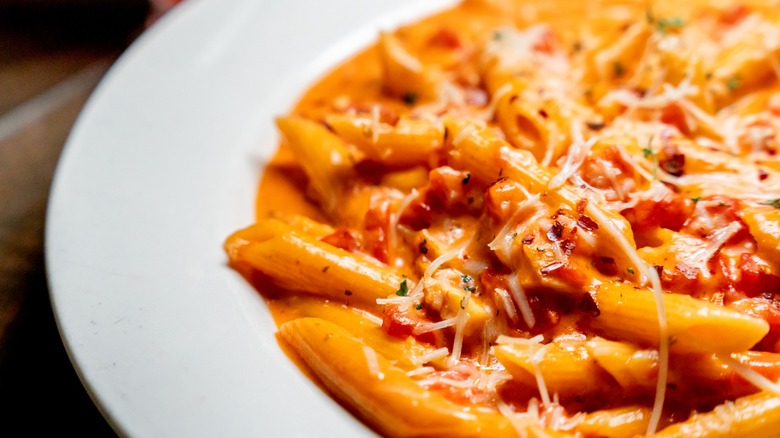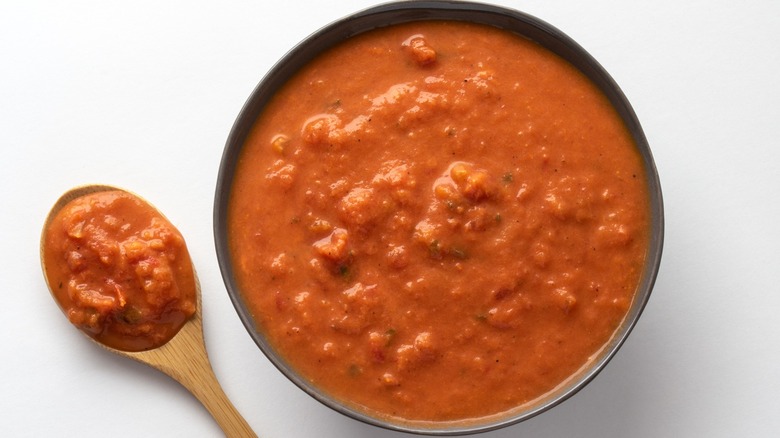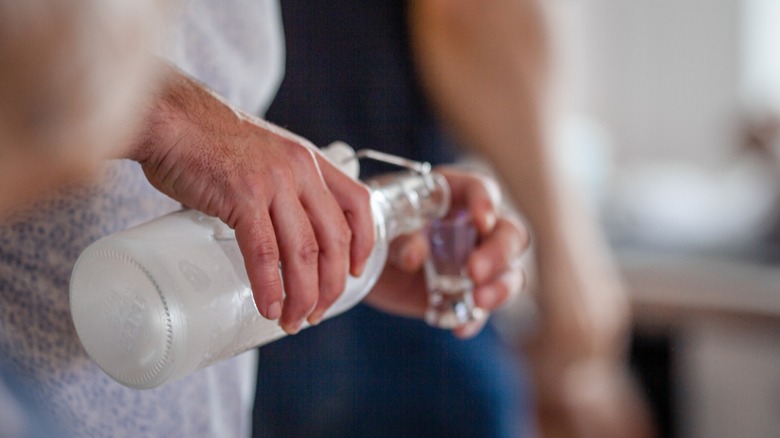Vodka Sauce Is Not Nearly As Old As You May Think
Penne alla vodka isn't just your average pasta. It's a pasta dish with a rebellious streak thanks to that splash of vodka mixed into the classic combination of heavy cream, penne, and tomato sauce. The booze makes it a little bit naughty, and it's what makes penne alla vodka stand out in a world full of marinara and Alfredo. Whether you're twirling your fork at a high-end restaurant or devouring a plate post-happy hour, there's something special about a sauce that knows how to use alcohol in all the right ways. There's no doubt that penne alla vodka has earned its spot as a fan favorite.
Despite its popularity, there are many questions surrounding the vodka sauce. When was it invented? Is it Italian? American? Maybe even Russian? You might expect a boozy comfort food like penne alla vodka to have a centuries-old legacy, but this creamy, vodka-spiked dish only started making waves in the 1980s in America with a few stories surfacing around the enigmatic origins of vodka sauce in both Italy and the U.S.
The murky origins of vodka sauce
The origins of vodka sauce are shrouded in debate, with both the U.S. and Italy vying for credit. Vodka sauce first appeared in American print in the early 1980s, and by the end of the decade, it had taken the culinary scene by storm. Most Americans trace the invention of vodka sauce to New York in the 1980s, with two widely accepted stories at the heart of its origin.
One credits James Doty, a graduate student at Columbia University who decided to liven up his sauce with a splash of vodka in true collegiate fashion. The other attributes it to Chef Luigi Francese of Orsini restaurant who used vodka to thin out a sauce made with cream and tomato pulp, and he also dubbed this dish penne alla Russa as a nod to vodka's Russian roots.
However, the Italian side also offers compelling stories about the origins of vodka sauce starting as early as the 1970s. In 1974, Italian actor Ugo Tognazzi shared an early version of vodka sauce in his cookbook L'Abbuffone, where he called it pasta all'infuriata. His recipe featured penne, fresh peeled tomatoes, a shot of vodka, chili pepper, oil, garlic, and bay leaves.
Pasquale Bruno Jr., author of The Ultimate Pasta Cookbook, claims that penne alla vodka was created in the 1970s at Dante, a restaurant in Bologna, Italy. Another theory suggests that the dish was invented by a Roman chef in the 1980s as part of a vodka company's marketing strategy to promote the spirit.
Sauce with booze: what alcohol does to your sauce
Though its origins remain unconfirmed, the magic vodka brings to the pasta is confirmed. But that raises the question: does vodka actually do anything for the sauce, or is it just there for a bit of flair? And the answer is that vodka is transformative, whether it's Grey Goose or the Kirkland offshoot. The booze doesn't just add flair; it works behind the scenes that binds everything together while enhancing the flavors.
When incorporated into your sauce properly, vodka acts as a powerful binder that helps oil- and water-based ingredients combine smoothly. The ethanol in vodka, acting as a solvent, works like glue to bind the water and fat together, resulting in a smoother, glossier, and creamier emulsified sauce. At the same time, vodka's neutral, mild flavor enhances the overall taste without overpowering the dish. Ethanol also helps carry the aromatic compounds in tomatoes, cream, and other ingredients, heightening the full flavor experience and bringing more depth to the sauce.
Although the type of vodka you use in your sauce doesn't really matter, always be extra careful with how much you add. A bit too much, and your dish might start tasting like a wild night gone wrong instead of that perfect, comforting pasta with a tipsy twist. The goal is to bring out the flavors, not drown them in booze. Even after the vodka cooks down, a little alcohol will still hang around, but it will have already done its job.


